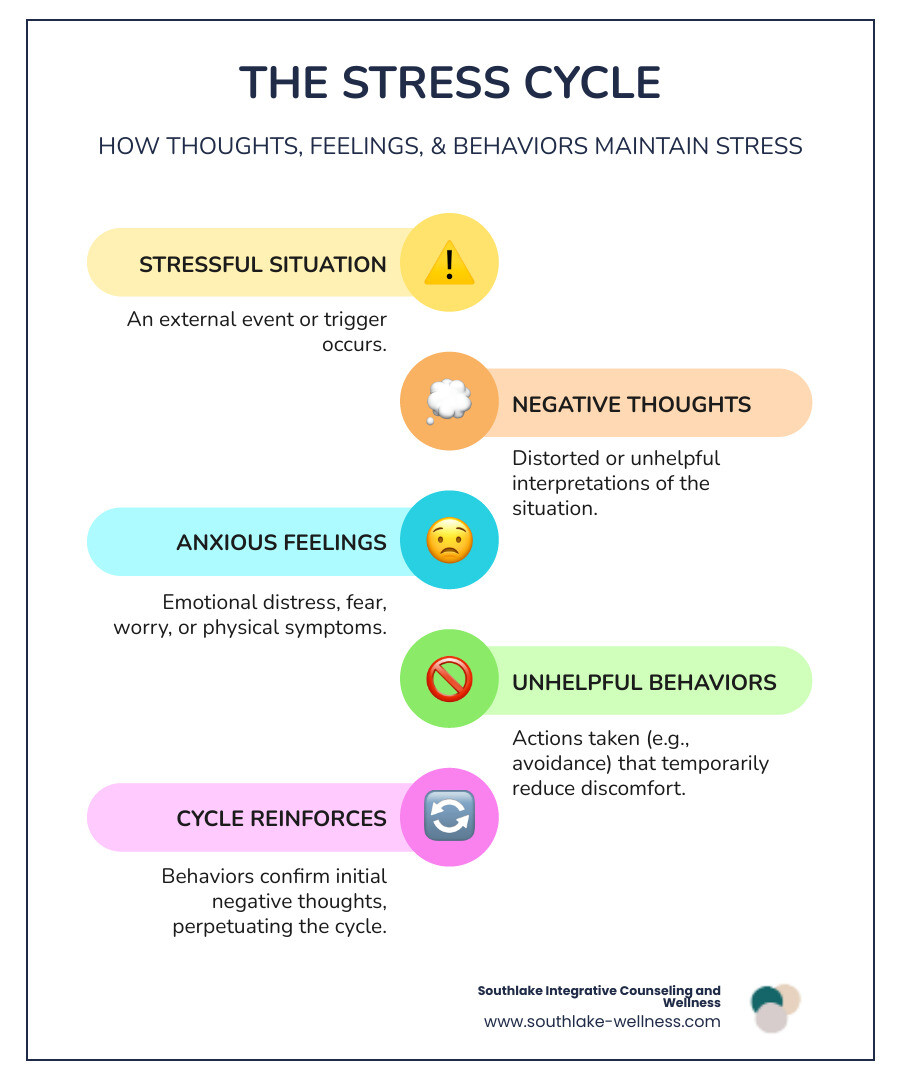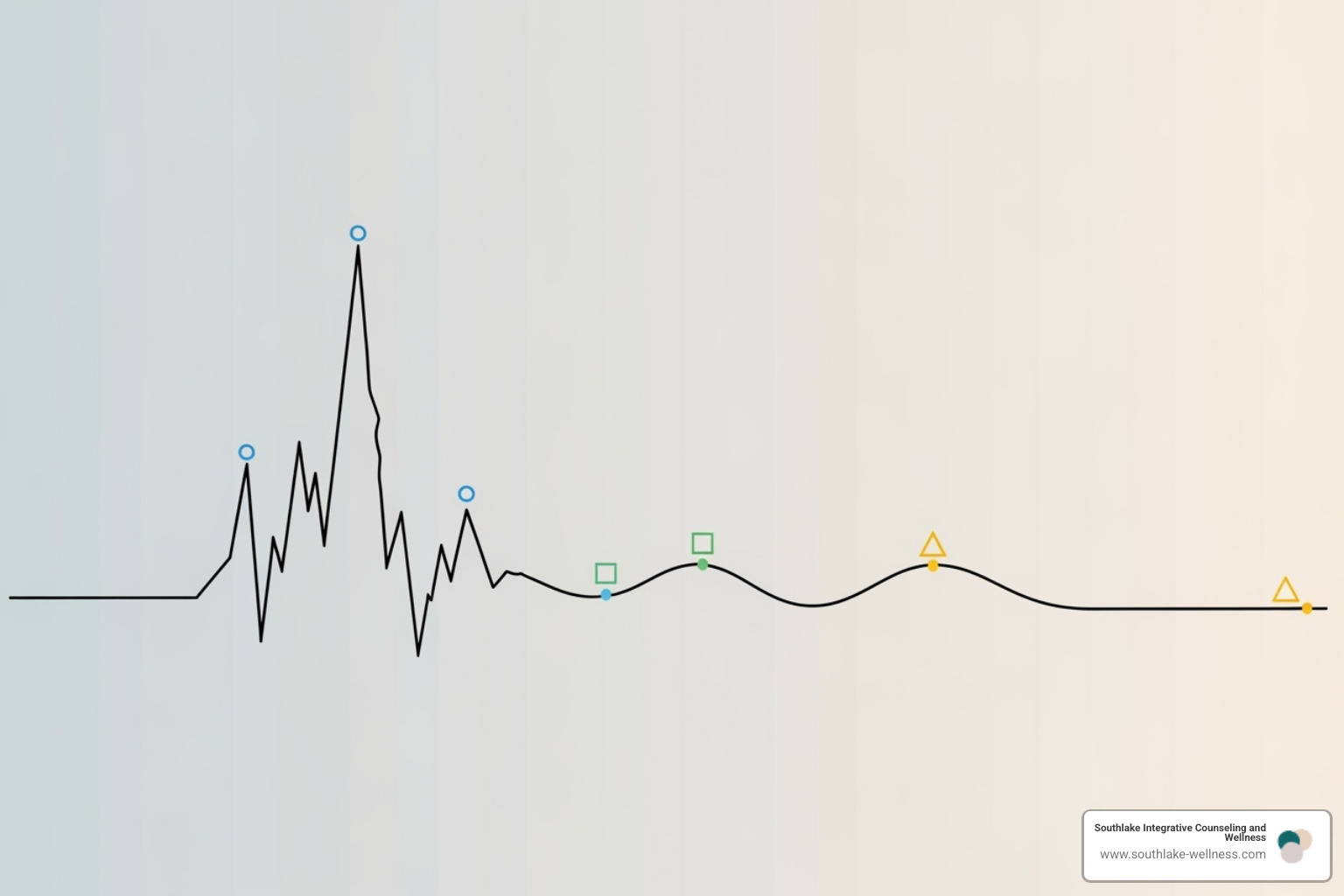
Why Behavioral Therapy for Stress Management Changes Everything
Behavioral therapy for stress management offers a science-backed approach to breaking free from chronic stress. Unlike therapies that focus on the past, Cognitive Behavioral Therapy (CBT) gives you practical tools to change how you think and respond to stress right now.
Quick Answer: How CBT Works for Stress Management
- Identifies negative thought patterns that fuel stress
- Challenges distorted thinking with evidence-based techniques
- Teaches practical coping skills for real-life situations
- Targets both mental and physical stress responses
- Provides lasting tools you can use independently
With nearly half of Americans reporting increased stress, you're not alone if you feel overwhelmed by work, relationships, or life's constant challenges.
The good news is that stress isn't caused by what happens to you, but by how you think about what happens to you. This is the foundation of CBT, which research shows is highly effective for stress, anxiety, and depression. CBT works by interrupting the cycle where negative thoughts create distressing feelings and drive unhelpful behaviors. When you learn to break this cycle, you gain real control.
This guide explains how CBT works, from its core principles to techniques you can use today.
I'm Holly Gedwed, a Licensed Professional Counselor Associate. With 14 years of experience in behavioral therapy for stress management, I've helped countless clients use CBT to break free from stress and build lasting confidence.

Understanding Cognitive Behavioral Therapy (CBT) and How It Tames Stress
Think of Cognitive Behavioral Therapy (CBT) as a structured, goal-oriented form of talk therapy focused on the here and now. It helps you understand the connection between your thoughts, feelings, and behaviors so you can change patterns that cause stress.
The core insight of CBT is that our stress often comes not from events themselves, but from our interpretation of them. For example, being stuck in traffic can be a minor annoyance or a catastrophe, depending entirely on your thoughts. At Southlake Integrative Counseling and Wellness, we see this mind-body connection daily. By changing your thoughts, you can calm your physical stress response—slowing a racing heart, relaxing tense shoulders, and deepening your breath. Behavioral therapy for stress management through CBT soothes your entire system.
To help you understand what makes CBT unique, here's how it compares to traditional psychoanalytic approaches:
FeatureCognitive Behavioral Therapy (CBT)Psychoanalytic TherapyFocusPresent-day thoughts, feelings, and behaviorsPast experiences, unconscious conflicts, and early childhoodGoalIdentify and change unhelpful patterns to relieve current symptomsUncover roots of problems, gain insight into unconsciousApproachStructured, goal-oriented, collaborative, skill-basedLess structured, long-term, interpretiveDurationOften shorter-term (e.g., 12-20 weeks)Typically long-term (months to years)Therapist RoleActive coach, educator, partnerInterpretive, less directive
The Core Principles of CBT for Stress
CBT is built on four powerful principles that make it an effective tool for managing stress.
First, stress problems often stem from unhelpful thinking patterns. These mental habits, called cognitive distortions, can make small challenges feel overwhelming.
Second, we often learn behavioral patterns that worsen stress. Avoiding difficult conversations or over-committing can feel protective in the moment but keeps us stuck in stress cycles.
Third, problematic core beliefs about ourselves and the world fuel ongoing stress. Believing you're not capable or that the world is unsafe keeps your stress response constantly activated.
The fourth and most hopeful principle is that people can learn better ways of coping. Through active collaboration with your therapist, you develop real skills to rewire your stress responses and build lasting emotional resilience.
What Types of Stress Can CBT Address?
One of the most encouraging things about CBT is its versatility. You don't need a formal diagnosis to benefit from behavioral therapy for stress management.
CBT is highly effective for everyday stressors that make life feel unmanageable, including:
- Workplace stress: Handling deadlines, difficult colleagues, and heavy workloads.
- Relationship stress: Improving communication, navigating conflict, or managing major transitions like divorce.
- Student anxiety: Research shows CBT can significantly reduce anxiety and increase hope, even in high-pressure academic environments.
- Major life transitions: Gaining a roadmap for navigating a new job, relocation, or loss with greater confidence.
CBT is also a first-line treatment for many mental health conditions, such as anxiety disorders (generalized anxiety, social anxiety, panic disorder), depression, PTSD, and OCD. Furthermore, it helps with physical conditions influenced by stress, like insomnia, chronic pain, migraines, and irritable bowel syndrome (IBS), by breaking the stress-symptom cycle.
At Southlake Integrative Counseling and Wellness, we tailor these proven principles to your unique situation, helping you find your footing during life's inevitable challenges.
A Practical Guide to Behavioral Therapy for Stress Management

Behavioral therapy for stress management is an active, collaborative process. It's not about passive listening; it's about practicing new skills. While meaningful relief typically develops over 12 to 20 weeks, the journey is unique to each person.
The process begins with an assessment to map your stress triggers and thought patterns. From there, we work together on goal setting, turning vague hopes into specific targets, like sleeping better or feeling more confident in meetings. The core of therapy is skill development, where you learn practical tools to manage thoughts and physical tension. Homework assignments, such as thought logs or breathing exercises, are crucial for applying these skills in your daily life and creating lasting change. We'll regularly evaluate your progress to ensure the therapy adapts to your needs.
Breaking the Cycle: How CBT Tackles Negative Thoughts
Our minds have unhelpful ways of twisting reality, known as cognitive distortions. Learning to spot and challenge these distortions is a key part of CBT. The process involves identifying the thought, challenging its validity, and reframing it into a more balanced perspective.
Here are some common distortions:
- Catastrophizing: Turning a minor setback into a major disaster (e.g., a small mistake at work means you'll be fired).
- All-or-nothing thinking: Seeing things in black-and-white terms. If it's not perfect, it's a total failure.
- Overgeneralization: Taking one negative event and seeing it as a never-ending pattern of defeat.
- Mental filtering: Focusing only on the negative aspects of a situation while ignoring the positive.
- Jumping to conclusions: Assuming you know what others are thinking (mind-reading) or predicting a negative outcome (fortune-telling).
- Emotional reasoning: Believing that because you feel something, it must be true (e.g., "I feel anxious, so there must be danger").
Recognizing these patterns is like turning on a light in a dark room, allowing you to see the situation more clearly.
Practical CBT Techniques You Can Use
CBT provides a toolkit of practical strategies for daily life:
- Thought logging: Keeping a journal to track stressful situations, thoughts, and feelings to identify patterns.
- Behavioral experiments: Testing your anxious predictions to see if they come true. Often, reality is far less scary than your fears.
- Activity scheduling: Intentionally planning enjoyable or meaningful activities to combat withdrawal and boost your mood.
- Relaxation techniques: Using deep breathing or progressive muscle relaxation to calm your nervous system and release physical tension.
- Problem-solving skills: Breaking down overwhelming challenges into manageable steps, brainstorming solutions, and creating an action plan.
The Role of Mindfulness in CBT

Mindfulness is a powerful addition to modern behavioral therapy for stress management. Mindfulness-Based Cognitive Therapy (MBCT) combines CBT with mindfulness to improve stress reduction.
Mindfulness involves observing your thoughts and feelings with present-moment awareness and non-judgmental observation. This creates psychological distance, so you're not swept away by stress. It interrupts the mental hamster wheel of worry and helps you tune into your body's early stress signals.
At Southlake Integrative Counseling and Wellness, we emphasize this mind-body connection. Regular mindfulness practice helps you develop the ability to respond to stress with intention rather than react on autopilot—a valuable skill for long-term well-being.
The Science-Backed Benefits and Long-Term Outlook of CBT
When we talk about behavioral therapy for stress management, we're referring to an evidence-based practice. Extensive research has tested CBT and found it to be a highly effective treatment with consistently impressive results.

Study after study shows that CBT delivers high efficacy rates for anxiety-related conditions, with benefits that often last for at least a year after treatment ends. Research demonstrates that it significantly reduces anxiety sensitivity, meaning you become less afraid of the physical sensations of anxiety. It also increases hope and resilience, which are powerful psychological resources for navigating tough times.
The mind-body connection we emphasize at Southlake Integrative Counseling and Wellness is supported by CBT research. The therapy calms your physiological stress response by teaching relaxation techniques while addressing the thoughts that trigger your fight-or-flight system.
Key Benefits and Potential Drawbacks
Like any approach, CBT has incredible strengths and a few considerations.
The benefits are impressive: it's highly effective for a wide range of issues, often works faster than other therapies, and is skill-based, empowering you with tools for life. Its structured, goal-oriented nature means you can track your progress. CBT is also adaptable and can be used alone or paired with other treatments.
However, CBT requires commitment. It's an active process with homework, and it can be challenging to confront ingrained negative thinking. It's also important to understand that CBT focuses on changing your response to stress rather than eliminating external stressors.
Long-Term Effects and Lasting Change
The true power of CBT lies in creating lasting change. The skills you learn are tools for life.
The sustained relief from CBT is well-documented. Because you're rewiring how you think and respond, the benefits stick around. Relapse prevention is a core part of the process, as you learn to recognize early warning signs and use your skills to manage them.
CBT empowers you with lifelong coping strategies. You develop a deep understanding of your own patterns and build the confidence that you can handle whatever life throws your way. This journey isn't just about reducing symptoms; it's about fundamentally changing your relationship with stress.
Frequently Asked Questions about CBT for Stress
When considering behavioral therapy for stress management, it's natural to have questions. Here are answers to the most common concerns.
How quickly does CBT work for stress?
Many people notice initial improvements within a few weeks. You might catch negative thoughts more quickly or feel less overwhelmed in stressful situations.
Significant and sustained relief typically emerges over the full course of treatment, which usually spans 12 to 20 sessions. Your progress depends on factors like the severity of your stress and your commitment to practicing the techniques between sessions. The clients who practice their skills consistently see the fastest and most lasting results.
Can I do CBT for stress on my own?
While there are many self-help books and apps available, working with a qualified therapist makes a tremendous difference. It's difficult to see your own patterns clearly when you're stressed.
A therapist provides personalized guidance custom to your situation, helps you steer challenges, and ensures you're applying techniques correctly for the most benefit. Self-help resources are excellent supplements to professional therapy but are not ideal replacements.
Is CBT covered by insurance?
Yes, most insurance plans do cover CBT because it is a gold-standard, evidence-based treatment. Insurance companies recognize that it is both effective and often shorter-term than other therapies.
Coverage details vary by plan, so we always recommend checking directly with your insurance provider about your mental health benefits, co-pays, and deductibles. At Southlake Integrative Counseling and Wellness, we are happy to help you understand your benefits and steer the process. Don't let insurance concerns stop you from getting the support you deserve.
Take the First Step Towards a Calmer You
We've explored how behavioral therapy for stress management through CBT offers a transformative path. It's not about creating a stress-free life, but about fundamentally shifting how you respond when life presents its challenges.
The beauty of CBT is its empowering nature. You develop a new set of skills, giving you practical tools to interrupt stress cycles before they spiral. You learn to recognize distorted thoughts for what they are—just thoughts, not facts—and find you have more control over your internal experience than you imagined. This journey toward building lifelong resilience is worth the effort.
At Southlake Integrative Counseling and Wellness, we understand that stress is personal. Our holistic approach combines the proven effectiveness of CBT with a deep understanding of the mind-body connection. We create personalized treatment plans that see you as a whole person, not just a collection of symptoms.
You don't have to carry the weight of overwhelming stress alone. Taking the first step is the beginning of reclaiming your peace of mind.
Ready to start your journey toward lasting calm and resilience? Find out more about our stress management therapies and find how our personalized, holistic approach can help you build the skills you need for a more balanced, empowered life.